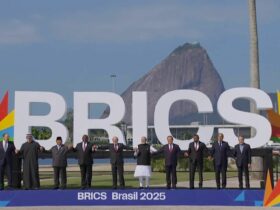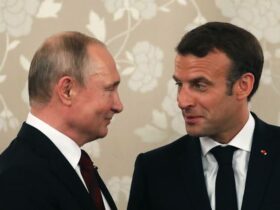Last week, the public agenda in Turkey had three main topics:
First was the normalization process between Ankara and Tel Aviv, after relations were strained with the attack carried on the Turkish aid ship Mavi Marmara – on course to the Gaza Strip, by Israeli forces back in 2010.
Second was the planning of a visit by the Russian President Vladimir Putin to Turkey, in parallel with regional issues and the Ukrainian crisis.
And third was the sudden rise in the electricity bills that became one of the biggest problems for the average citizen, and the reactions against the government.
Normalization process between Turkey and Israel
Relations between Turkey and Israel were strained after the killing of 10 Turkish citizens in the attack conducted on the aid ship Mavi Marmara back in 2010. When attacked, the Mavi Marmara was heading to the Gaza Strip to protest the Israeli blockade against this entity.
Nowadays these two countries are in an effort of rapid normalization. Although the steps were briefly paused with President Erdogan getting the coronavirus, the efforts now continue with some visits of Israeli officials behind the scene.
Israeli Prime Minister Naftali Bennett said that his country’s President Herzog is an “extraordinary diplomatic gem” in the normalization with Turkey.
The Israeli PM also noted that two countries were deeply coordinating many activities including a possible visit of Turkey by President Herzog, and added:
“We will act very carefully with Turkey. The country is at least not a great friend to Iran. That is why we should avoid any naïve actions that can harm any coordination or alliance with this country.”
On the other hand an Israeli official speaking to Haaretz said that a possible Erdogan-Herzog meeting would be a “good testing ground” for the future normalization actions between Turkey and Israel.
According to Turkish newspapers, the General Director of the Israeli Foreign Ministry Alon Ushpiz met with the Turkish Presidential Spokesperson Ibrahim Kalin just before a possible meeting between the two presidents in the next month.
Russian President Vladimir Putin’s possible visit to Turkey
The Russian President Vladimir Putin is expected to visit Turkey soon.
The news in the Russian media suggest that the visit is certain, while the exact date of the visit will be determined in the next few days.
Earlier on Tuesday, Kremlin Spokesman Dmitry Peskov said that an agreement between Moscow and Ankara on Putin’s visit existed, without specific dates having been agreed upon yet.
Peskov stated “Putin was pleased by such an invitation by Erdogan. They agreed on a meeting as soon as the pandemic measures and busy schedule of Putin allows”.
Erdogan noted they had been offering a mediator role between Russia and Ukraine:
“There has been a positive answer from Mr. Putin regarding a visit to Turkey after his visit to China. We are now discussing about an exact date of this visit. And later on we wish to discuss a possible mediation between Mr. Putin and Mr. Zelensky. We have already agreed on that with Mr. Zelensky.”
On the other hand Kremlin Spokesperson Peskov made clear that no such mediation of Turkey between Russia and Ukraine was agreed upon.
Crisis on electricity bills deepens
With the new price increases on electricity, the middle-class citizens in Turkey were unable to pay their bills. A wave of protests has spread across Turkey and many businesses face the threat of going broke amid already galloping inflation.
The hikes of up to 127 percent came atop other sharp price increases, and small shopkeepers have been at the forefront of the outcry, posting their electricity bills on shop windows and dimming their lights in the evenings.
Many complain that electricity bills now outstrip their rents. A growing number of cafes and restaurants have pulled the plug on outdoor electric heaters, or begun to charge clients for their use.
Critics blame also Ankara’s privatization policies. The AKP government, in power since 2002, has privatized power distribution across the country and private companies close to the ruling party now run most of the grids.
Amid the nationwide outcry, Erdogan announced on January 31st that the threshold of low consumption, which is priced more favorably, was raised to 210 kWh from 150 kWh per month. And earlier this week, a senior Erdogan aide pledged “fresh steps to alleviate the burden of citizens.”
The main opposition Republican People’s Party (CHP) led street protests across the country February 9th, as the party leader Kemal Kilicdaroglu said “I will not pay any of my electricity bills from today until Erdogan withdraws the price hikes which he signed on December 31st”.
In a video released on his Twitter account, Kilicdaroglu also called for a reduction in the value-added tax imposed on power bills to 1% from 18%.
The Leader of Vatan Party Dogu Perincek called for a nationalization of the energy distribution companies:
“Energy must be distributed for the land to be farmed, for the cogs of the industry to work, for our streets and markets to be illuminated, for our people’s needs and for the better of the society, and certainly not for some company’s profits. We need nationalized and renewable energy sources. Development of safe and clear nuclear energy is crucial for the future of Turkey. We propose to the current government under President Erdogan to nationalize the energy distribution companies and distribute citizens cheaper energy, for agricultural and industrial production and for our own security.”
Perincek also stated that this energy crisis is not limited to Turkey and that it can be solved in coordination with the country’s neighbors:
“We can overcome this global energy crisis with cooperation with our neighbors. We can provide cheaper gas, fuel and electricity by cooperating with some of our neighbors such as Iran, Iraq, Azerbaijan, Russia, Qatar and Algeria. Vatan Party is already making contacts to resolve this crisis. The only obstacle is the trust we can provide to these nations, against the threats directed towards the region by the USA”.

















Leave a Reply